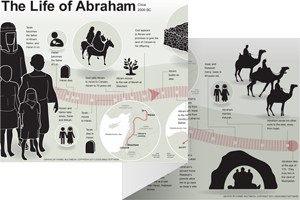20:1–18 Abraham repeats the mistake he made in Egypt (Gen 12:10–20). Finding himself in the foreign territory of Gerar, he again claims that Sarah is his sister out of fear of personal harm (vv. 2, 11; compare 12:11–12). In both instances God intervenes and protects Abraham. Here, God intervenes by appearing to Abimelech, the foreign king, in a dream (vv. 3–7). |
20:1 the Negev The narrative about Sodom and Gomorrah places Abraham in Mamre, near Hebron. Now he has migrated to the Negev, the desert area between Canaan and Egypt, southward toward the Sinai Peninsula.
Shur A defensive wall in the eastern Nile delta.
Gerar A Canaanite city in the western Negev. See note on 26:6.
20:2 She is my sister Just like when Abraham and Sarah went into Egypt (12:10–20), Abraham fears that his life is in jeopardy.
Abimelech This is a fairly common personal name in northwest Semitic literature (Ugaritic and Phoenician literature). It means “my father is king,” and may be a title.
took Sarah It is possible that the goal of Abimelech’s taking Sarah in marriage would be to form an alliance with Abraham, a man of great wealth and reputation after the war described in ch. 14. See 21:22–23, where Abimelech seeks a friendly nonaggression agreement with Abraham.
20:3 God came to Abimelech in a dream Dreams are a common mode of divine communication in biblical (31:11, 24; 37:5–10) and extrabiblical literature.
are a common mode of divine communication in biblical (31:11, 24; 37:5–10) and extrabiblical literature.
20:4 my Lord In the Hebrew text here it is not the divine name, Yahweh, that is used but adonay—the customary address to a divine being (see 18:3 and note).
a righteous people The members of Abimelech’s household.
20:5–7 God affirms Abimelech’s innocence and commands him to send Sarah back to Abraham. |
20:5 integrity of The Hebrew word tom (“integrity”) means “blameless” or “upright.” It is used when God commands Abraham to walk before Him and be blameless (17:1). Here it is the foreign king, Abimelech, who is blameless rather than Abraham.
20:7 a prophet Prophets were essentially spokespersons for and representatives of God. They exhorted people to be loyal and obey his commands lest judgment occur.
he will pray for you God will accept Abraham’s intercession since Abraham is His chosen representative. Abimelech will need to return Sarah and treat Abraham well in order to receive any prayer of blessing.
20:9 What have you done to us Though forewarned—and despite the fact that he will return Sarah to Abraham without having sexual relations with her (v. 6)—Abimelech is angry with Abraham.
20:11 there is no fear of God Abraham views Abimelech and his people as lacking any sense of morality that would come from belief in the one true God. As he did in Egypt, Abraham lets fear of being harmed determine his decision (12:11–13).
20:12 my sister Sarah is Abraham’s half-sister—such marriages seems to have been culturally acceptable at this point in time in the ancient Near East. Despite later prohibitions under the law (see Lev 18), 2 Sam 13:13 and Ezek 22:11 indicate that close kinship marriages still occurred.
20:13 caused me to wander from the house of my father Refers to the command of Gen 12:1.
20:14 he gave them to Abraham Just as he did in Egypt (see 12:16 and note), Abraham profits greatly despite his deception.
20:15 settle where it pleases you When Abraham lied to Pharaoh, Pharaoh sent him away (12:19–20). Here Abimelech allows Abraham to remain wherever he chooses.
20:16 shall be an exoneration The Hebrew phrase used here may be literally rendered “it is to you a covering of the eyes.” The meaning of this is uncertain, but the rest of the sentence makes clear that it indicates vindication. The phrase may have belonged to a legal or covenant formula.
20:18 had completely closed up all the wombs This suggests that Sarah was in the king’s company long enough for the people in his household to notice the absence of any new pregnancies.

|
About Faithlife Study BibleFaithlife Study Bible (FSB) is your guide to the ancient world of the Old and New Testaments, with study notes and articles that draw from a wide range of academic research. FSB helps you learn how to think about interpretation methods and issues so that you can gain a deeper understanding of the text. |
| Copyright |
Copyright 2012 Logos Bible Software. |
| Support Info | fsb |
 Loading…
Loading…



